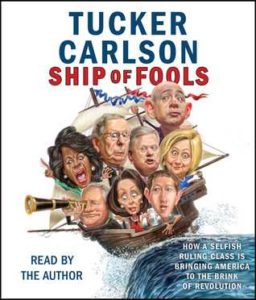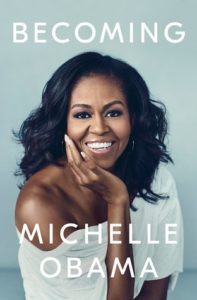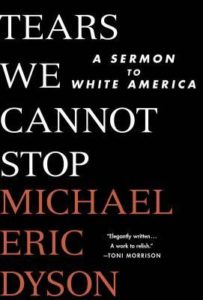In an effort to understand the current state of affairs in our country, I have been reading a bunch of “political” books. I am constantly seeking answers to “How did we get to this?” and “What can we do about it?” Theology has plenty of answers to those questions, starting with original sin and the seven deadly sins. But I have been delving into the political aspects of all that. I recently read three books that, taken as a whole, have been very enlightening. “Ship of Fools” by Tucker Carlson, “Becoming” by Michelle Obama, and “Tears We Cannot Stop” by Michael Eric Dyson.
 The first book, “Ship of Fools” was the least enlightening of the bunch. The author, Tucker Carlson, is a conservative talk show host on Fox. The Prologue and first few chapters of the book were very interesting. Carlson talked about a political elite that doesn’t care about middle class or working class people. Democrats and Republicans have become more like each other and both have gone horribly wrong in governing. To this point in the book I was totally with him. But then his book devolved into a rant against liberals with no solutions about how to get the governing elite to listen to us. His conclusion: the political elite needs to listen to the masses. Hmph. Good luck with that.
The first book, “Ship of Fools” was the least enlightening of the bunch. The author, Tucker Carlson, is a conservative talk show host on Fox. The Prologue and first few chapters of the book were very interesting. Carlson talked about a political elite that doesn’t care about middle class or working class people. Democrats and Republicans have become more like each other and both have gone horribly wrong in governing. To this point in the book I was totally with him. But then his book devolved into a rant against liberals with no solutions about how to get the governing elite to listen to us. His conclusion: the political elite needs to listen to the masses. Hmph. Good luck with that.
 The second book, “Becoming” by Michelle Obama, is an autobiography. Actually, the publisher calls it a memoir, but “Becoming” covers all of Michelle Obama’s life through the inauguration of Donald Trump. I loved the old pictures of Michelle growing up and the pictures of her early life with Barack Obama. You can tell that Michelle and Barack truly love and respect each other. “Becoming” also describes the sacrifices Michelle made to support Barack’s vision of what the United States should be.
The second book, “Becoming” by Michelle Obama, is an autobiography. Actually, the publisher calls it a memoir, but “Becoming” covers all of Michelle Obama’s life through the inauguration of Donald Trump. I loved the old pictures of Michelle growing up and the pictures of her early life with Barack Obama. You can tell that Michelle and Barack truly love and respect each other. “Becoming” also describes the sacrifices Michelle made to support Barack’s vision of what the United States should be.
I am a total subscriber to Barack Obama’s vision of the United States as a place where everyone is equal under the law. The diversity in government that he brought were as important to me as any of his policies. I am tired of being governed by white men who think, in their paternalism, that they can make rules for women and people of color. I believed that our country was making slow but sure progress toward this very Christian model of accepting and loving people as they are. Thus my shock and horror when I woke up in 2016 to find out a misogynistic, racist white man had been elected as our president.
Obama focuses on her family and her country in this excellent book. Sometimes we forget that she is a professional woman that had her own goals for her life. They did not include politics, but she has been a shining example of someone who held to her ideals no matter what others did or said to her and about her. She writes about all of this in “Becoming.”
 The third book, “Tears We Cannot Stop,” is written by Michael Eric Dyson. Michael is a sociology professor at Georgetown University who writes eloquently about the racism that is alive and well in our society today. “Tears We Cannot Stop” is structured as a worship service with hymns, a call to prayer, and a sermon. He is writing the book to white Americans who need to repent of their white privilege and the societal structures we have put in place to protect it.
The third book, “Tears We Cannot Stop,” is written by Michael Eric Dyson. Michael is a sociology professor at Georgetown University who writes eloquently about the racism that is alive and well in our society today. “Tears We Cannot Stop” is structured as a worship service with hymns, a call to prayer, and a sermon. He is writing the book to white Americans who need to repent of their white privilege and the societal structures we have put in place to protect it.
I found this book very convicting. I do not think I am racist, but I have not had much contact with black people during my life. Growing up in a small town, going to predominantly white schools, serving predominantly white churches. I am surrounded by more black people living in Georgia than I ever was in Ohio.
Michael Dyson argues, however, that by ignoring racism I am complicit in it. I haven’t personally participated in it, but I have benefited by it. And I have not actively worked to overcome racism. I know that black people are stopped by police in higher numbers than whites. I know that black men are much more likely to be killed by police officers than are white men. We keep black people in neighborhoods with poorer schools and fewer resources. What have I done to change any of that?
Fortunately Dyson gives some suggested actions in his chapter “Benediction” which I found very helpful. First, he suggests reparations. Affirmative Action is a kind of reparation, although it is not being supported much these days. But why shouldn’t black people have preference for positions? We have done so much to oppress them, shouldn’t we help lift them up? Reparations can be giving money for a scholarship for a black student, hiring a black person as your lawyer or plumber, or giving money to a teacher at a predominantly black school to buy money for supplies. Paying for a black child to go to summer camp or pay for their fees for sports. Being creative in transferring a bit of our resources.
Another thing Dyson suggests we do is educate ourselves about black life and culture. He gives a reading list of black authors. He suggests we visit places that honor civil rights workers and places that tell the truth about the destructiveness of slavery.
A third suggestion is having discussions with other whites that challenge their racist stereotypes or open their eyes to white privilege. White privilege creates the space for black oppression. And if we stay silent, we are helping racial injustice persist.
Finally Dyson suggests participation in protests, rallies, and local community meetings. Attend a black church. Make a black friend. Powerful stuff and challenging me to think outside my white box.
I appreciated reading all three of these books: “Ship of Fools,” “Becoming,” and “Tears We Cannot Stop.” The books did what they were supposed to do – make me think and consider other points of view. I have thought a lot about them, especially “Tears We Cannot Stop.” I continue to pray for God to use me to combat racism and divisiveness in our country. I’m not sure how to change things, but doing nothing is not an option.

What I find more shocking and frightening than the one racist, bigoted man in office, is that over half this country, 60+ million people!, think a similiar way. I know there are many different views, beliefs, and opinions out there, and that is mostly a good thing. But having the view to hate and oppress entire groups of people for there beliefs, color, gender, etc. is something I just can’t wrap my head around. That is not a difference of opinion, but a difference of principle. Did I know there were racist people in this world, in my own community, of course; but never did I image the extent. I too thought this country was making progress with the Obama administration; a racist country wouldn’t elect a black man, right? But then to come to the realization that it was not so much the support for Obama as it was that many people simply wouldn’t under any circumstance support a woman. Such sad times. But you challenge me Karen, challenge me to ask if I am complicit. Do I shake my head at others as I reap the benefits of my white job, in my white house, in my white town? Is there something more I can do to fight this ignorance?
I am thankful to have you as a friend and someone who is also willing to struggle with big questions and change behaviors as needed. There actually are a lot of us amid all the sexist and racist noise. We can make a difference. The only way things have ever changed is for people to care passionately about them.
Thank you AGAIN Pastor Karen for always speaking about and supporting things that most people don’t seem to be concerned about.
????
I love the Idea of what Karen and Kristine spoke of. In my dreams we would all be equal regardless of color or sex. But my reality of growing up as a white female in Detroit taught me that whites do not own racism. Most black people are racist and angry against white people. Many times growing up as a minority in my neighborhood I would hear my peers say they would like to kill all white people off the face of the earth and how much better off the world would be without white people in it. Isn’t this what the Nazis tried to do to the Jews?
I suggest to Karen and Kristine that you both move to a predominately black neighborhood of Detroit or Chicago and live in the neighborhood for a year. I believe you will discover that while helping individual black people by throwing money at them is a wonderful kum-ba-ya experience for white people to feel good about themselves and eradicate any kind of appearance of racism on their part it will not “fix” racism with black and white people. Now if you would like to help a fellow american who shows a promising future and could use a helping hand (regardless of sex or the color of their skin) that would be wonderful for that individual and more to the tune of kum-ba-ya.
I am a white woman who has been discriminated against while growing in a predominately black neighborhood for the color of my skin. Into my adulthood I was discriminated against because I am female, but I never let it stop me and I persevered. This is the teachings we must pass on to our children. To be kind to others, choose joy each day, persevere, and let the past go regardless of our sex or the color of our skin.
Thank you for sharing your experience. Racism is definitely a problem experienced by and perpetrated upon people of all colors. Love your last sentence: kindness, perseverance, and choosing joy. May you continue to persevere and be blessed.